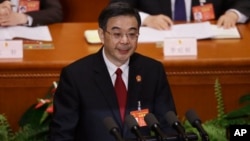The convictions of a prominent defense attorney and his associates were among the country’s top legal achievements last year, China’s chief justice said Sunday, highlighting a case that has been criticized by Western governments and rights groups.
In a report to the national legislature, Zhou Qiang also said that China, which is believed to execute more people than the rest of the world combined, gave the death penalty “to an extremely small number of criminals for extremely serious offenses” in the past 10 years.
The actual number of executions in China is a state secret. A 2007 decision that all death sentences must be reviewed by the Supreme People’s Court is believed to have reduced the number of executions dramatically.
Rights lawyer jailed
Zhou praised courts for severely punishing crimes against state security and violent terrorism, and said the trend will continue in order “to resolutely safeguard the country’s political security.”
The only case of subverting state power he highlighted was that of Zhou Shifeng, director of a law firm that used to be one of the country’s best-known advocates for human rights. He was sentenced to seven years’ imprisonment in August for attempting to manipulate public opinion and harm national security.
Rights groups and Western governments including the U.S. had urged China to release Zhou and other activists and lawyers detained in a sweeping crackdown that began in 2015. Critics say it’s about the ruling Communist Party silencing opponents.
The chief justice’s report didn’t say how many people were prosecuted or convicted of such offenses, or how many cases were handled.
Corruption crackdown
Hundreds of people have been killed in recent years in attacks in the northwestern Xinjiang region, which Beijing blames on Islamic militants and separatists from the Uighur minority. Activists say repressive government policies have exacerbated tensions and radicalized local youth.
For the past four years, China has also carried out a crackdown on corruption intended to net officials at all levels. Chief Justice Zhou said that Chinese courts dealt with 45,000 cases of graft involving 63,000 people last year, an increase from 2015. A total of 35 were at or above ministerial or provincial level, he said.
In a separate report to the assembly, China’s top prosecutor, Cao Jianming, said that the government last year initiated investigations against 47,650 people for taking advantage of their official posts. He said 48 officials above the rank of minister were prosecuted, including Ling Jihua, a former chief of staff to ex-President Hu Jintao, who was sentenced to life in prison in July for taking bribes, illegally obtaining state secrets and abusing power.
Dui Hua, a U.S.-based rights group, estimated that about 2,400 people were executed in China in 2013, one-tenth the number in 1983. It said that according to its sources, the number of annual executions remained largely unchanged in 2014 and 2015.
China typically hands out death sentences in cases of murder, rape, robbery and drug offenses.




